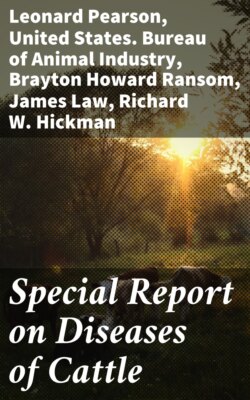Читать книгу Special Report on Diseases of Cattle - Lowe - Страница 151
На сайте Литреса книга снята с продажи.
SUNSTROKE (PROSTRATION FROM HEAT).
ОглавлениеOwing to the fact that cattle are seldom put to work at which they would have to undergo severe exertion, especially in collars, they are not frequently prostrated by the extreme heat of the summer months. When at pasture they select the coolest places in the shade of trees, in water, etc., when the heat becomes oppressive, and thereby avoid, as much as possible, the effects of it.
It does happen, however, that cattle that have been kept up for the purpose of fattening, when driven some distance in very hot weather, are sometimes prostrated, but it must be remembered that it is not really necessary for the animal to be exposed to the rays of the sun, as those confined in hot, close places may suffer. This often happens in shipping, when they are crowded together in cars.
Symptoms.—The premonitory signs are those of exhaustion—dullness, panting, frothing at the mouth, tongue hanging out, irregular gait, uneasiness, palpitation—when, if the circumstances which tend to the prostration are not mitigated, the animal staggers or sways from side to side, falls, struggles for a while, and then gradually becomes quiet, or the struggles may continue, with repeated but ineffectual efforts to regain a standing position. In serious cases the attack may be very sudden, unconsciousness occurring without continued or distressing premonitory symptoms.
Treatment.—At first, when not very serious, removal to a quiet, sheltered place, with a few days on a reduced diet, is all that need be done. When the animal has fallen, apply cold water or ice to the head; rub the body and limbs with cloths or wisps of straw and continue the rubbing for a considerable time. If the power of swallowing is not lost (which may be ascertained by pouring a little cold water into the mouth), give 3 drams of stronger liquor ammonia, diluted with a quart of cold water. Be very careful in drenching the animal when lying down. Repeat the drench in a half hour and an hour after the first one has been given. Instead of the ammonia, a drench composed of 3 ounces of spirits of nitrous ether in a pint of water may be given, if more convenient, but the ammonia drench is preferable. If unconsciousness continues, so that a drench can not be administered, the same quantity of ammonia and water may be injected with a syringe into the rectum. The popular aqua ammonia, commonly called "hartshorn," will do as well as the stronger liquor ammonia, but as it is weaker than the latter the dose for a cow is about 1½ ounces, which should be diluted with a quart of water before it is given to the animal, either as a drench or an enema. When ammonia can not be obtained, an ounce of tincture of digitalis may be given.
As soon as the animal is able to rise it should be assisted and moved to the nearest shelter. All the cold water it will drink should be allowed. The ammonia or spirits of nitrous ether drench should be administered every three hours so long as there is much failure of strength. The diet should be limited for several days—bran slops and a little grass. When signs of returning strength are presented, 12 ounces of Epsom salt dissolved in a quart of warm water may be given in those cases which have been down and unconscious, but do not give it while much weakness remains, which may be for several days after the attack. The flesh of an animal that is suffering from heat stroke should not be prepared for use as food. On account of the fever with which the animal suffers, the flesh contains toxins that may render it poisonous to the consumer.
